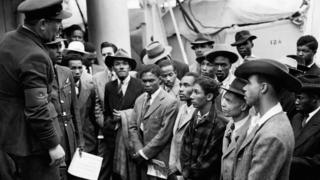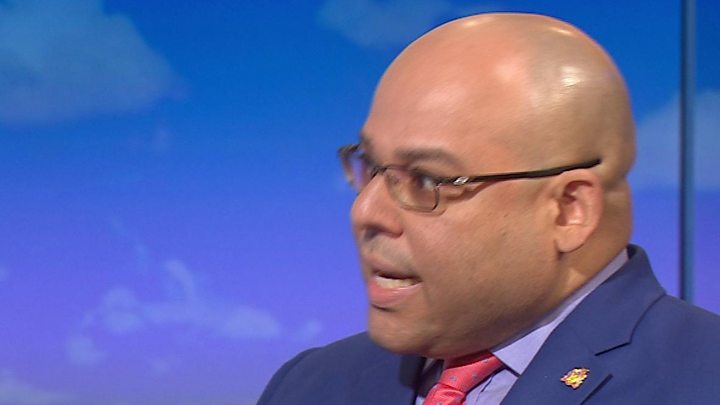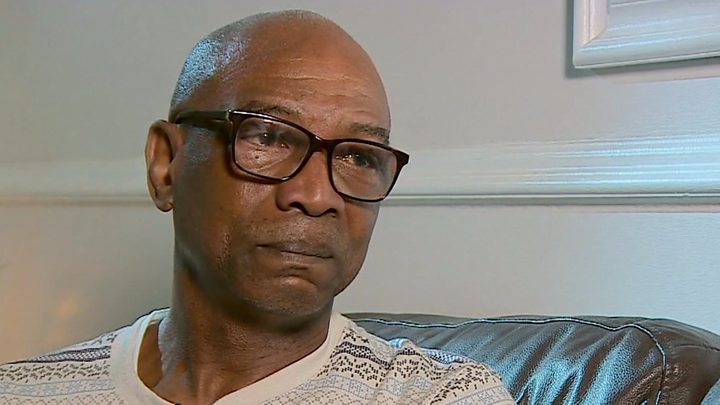 Image copyright
PA
Image copyright
PA
Thousands of people who arrived in the UK as children in the first wave of Commonwealth immigration face being threatened with deportation.
Despite living and working in the UK for decades, many of the so-called Windrush generation are now being told they are here illegally because of a lack of official paperwork.
Who are they?
Those arriving in the UK between 1948 and 1971 from Caribbean countries have been labelled the Windrush generation.
It began on 22 June 1948 when the ship MV Empire Windrush arrived at Tilbury Docks, Essex, which brought workers from Jamaica, Trinidad and Tobago and other islands, as a response to labour shortages in the UK.
The ship carried 492 passengers - many of them children.
It is unclear how many people belong to the Windrush Generation, since many of those who arrived as children travelled on parents' passports and never applied for travel documents - but they are thought to be in their thousands.
There are now 500,000 people resident in the UK who were born in a Commonwealth country and arrived before 1971 - including the Windrush arrivals - according to estimates by Oxford University's Migration Observatory.
The generation's end
The influx ended with the 1971 Immigration Act, when Commonwealth citizens already living in the UK were given indefinite leave to remain.
After this, a British passport-holder born overseas could only settle in the UK if they firstly had a work permit and, secondly, could prove that a parent or grandparent had been born in the UK.
Where are they now?
Many of the arrivals became manual workers, cleaners, drivers and nurses - and some broke new ground in representing black Britons in society.
The Jamaican-British campaigner Sam Beaver King, who died in 2016 aged 90, arrived at Tilbury Docks in his 20s before finding work as a postman.
He later became the first black Mayor of Southwark in London.
The Labour MP David Lammy, whose parents arrived in the UK from Guyana, describes himself as a "proud son of the Windrush".
Are they here legally?

The Home Office did not keep a record of those granted leave to remain or issue any paperwork confirming it - meaning it is difficult for Windrush arrivals to prove they are in the UK legally.
Because they came from British colonies that had not achieved independence, they believed they were British citizens.
International Development Secretary Penny Mordaunt said there was "absolutely no question" of the Windrush generation's right to remain.
She told BBC Radio 4's Today programme: "People should not be concerned about this - they have the right to stay and we should be reassuring them of that."
Theresa May's spokesman said the prime minister was clear that "no-one with the right to be here will be made to leave".
Why are they facing problems?

Those who lack documents are now being told they need evidence to continue working, get treatment from the NHS - or even to remain in the UK.
Michael Braithwaite, 66, moved from Barbados to the UK when he was nine with his father who took up work at the Post Office.
But last year, when he was working as a special needs teaching assistant, he was let go because he couldn't provide proof of his legal living status.
The Guardian newspaper has highlighted a number of cases of such people being threatened with deportation.
What has the government said?
The Home Office said delegates at this week's Commonwealth heads of government meeting in London would discuss the situation.
Immigration Minister Caroline Nokes told BBC Radio 4's World At One programme the government had "absolute responsibility" to prevent further "mistakes".
She said she was "personally sorry" to those affected.
Meanwhile, 140 MPs from across politics have written to Prime Minister Theresa May calling for an "immediate and effective" response to the concerns.
What about other Commonwealth arrivals?
Not everybody who arrived in the UK during the period faced such problems.
Children's TV presenter Floella Benjamin, who was born in Trinidad, said: "I could so easily be one of the Windrush children who are now asked to leave but I came to Britain as a child without my parents on a British passport."
Baroness Benjamin, 68, moved to Beckenham, Kent, in 1960.
"Before 1973 many Caribbean kids came to Britain on their parents' passport and not their own. That's why many of these cases are coming to light," she said.
How is the campaign progressing?
More than 130,000 people have signed a petition calling on the government to grant an amnesty to anyone who arrived in the UK as a minor between 1948 and 1971.
Its creator, the activist Patrick Vernon, calls on the government to stop all deportations, change the burden of proof, and provide compensation for "loss and hurt".
Mr Vernon, whose parents migrated to the UK from Jamaica in the 1950s, called for "justice for tens of thousands of individuals who have worked hard, paid their taxes and raised children and grandchildren and who see Britain as their home."
However, some people have objected to the word "amnesty" - saying it implies the Windrush generation were not legally entitled to live in the UK in the first place.
How are the Windrush celebrated?
Events are held annually to commemorate the ship Windrush's arrival 70 years ago, and the subsequent wave of immigration from Caribbean countries.
A model of the ship featured in the opening ceremony for the London 2012 Olympic Games, while the lead-up to Windrush Day on 28 June is being marked with exhibitions, church services and cultural events.
They include works by photographer Harry Jacobs, who took portraits of Caribbean families coming to London in the 1950s, which are being exhibited in Brixton, south-east London.